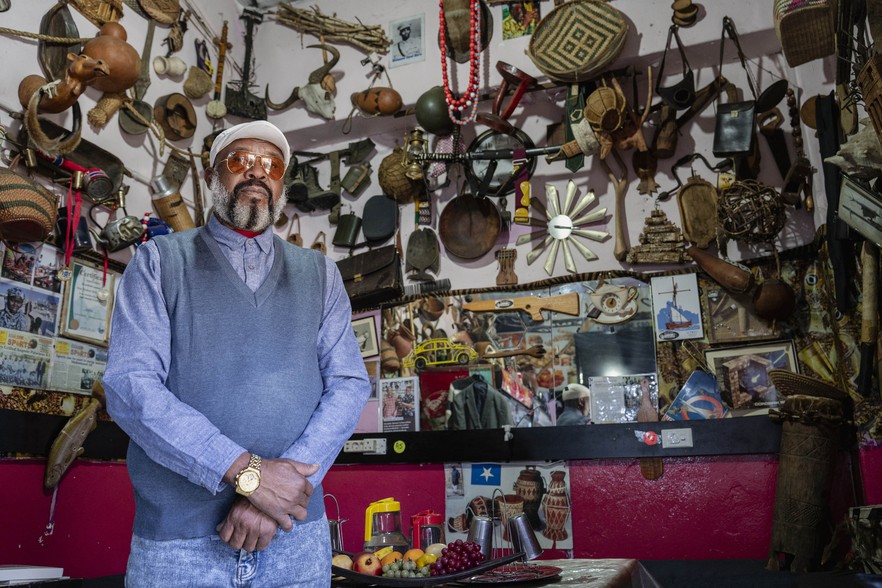
24 June 2025
Ibrahim Mohamed Ali inside his coffee shop in Mayfair. He has run this shop since 2009.
For more than 15 years, a Somali-owned coffee shop in Mayfair has been serving more than just qaxwo (Somali coffee).
Families gather at Ebrahim Qaxwo — the name of the shop — to remember their home country through spiced coffee and traditional Somali snacks. The walls are decorated with Somali ornaments and other memorabilia.
At the centre of it is 59-year-old Ibrahim Mohamed Ali, fondly known as “Uncle Ibrahim”.
But business has been slow recently as more franchise and upmarket coffee shops open nearby. “It’s very quiet these days. People still come, but not like before,” he said, adding that he was considering selling the shop to pursue other ventures.
Ali, like so many other Somalis, left Somalia in the late 1990s amid the bloody civil war. He spent some time in Tanzania and Zambia before settling in South Africa in 2000.
For the past two decades, he’s had refugee status, despite legislation stating that holding refugee status for five consecutive years makes one eligible to apply for permanent residence and thereafter pursue South African citizenship.
In 2021 the UN High Commissioner for Refugees (UNHCR) and the Department of Home Affairs launched the Asylum Backlog Elimination Project to deal with these backlogs.
Recently, the department told Parliament’s Home Affairs portfolio committee that the waiting times for asylum applications remained high. The department showed that in 2022, the average processing time peaked at over 3,000 days (over eight years). By last year, it still took nearly 2,600 days (over seven years) to finalise an application.
These delays are common and leave many asylum seekers in prolonged legal and social limbo, as they are unable to settle, open bank accounts, and start formal employment.
The walls of the coffee shop are decorated with framed photographs, Somali ornaments and other memorabilia.
To make a living Ali started doing small jobs like painting houses and fixing broken cars. Slowly, with the help of two friends and one of his brothers, he opened a small car workshop. By 2006, they found space in Newtown. Ali worked there with his older brother, Abu Bakr.
Then came the 2008 xenophobic violence that spread across the country. Ali and his family fled their home to shelter with other Somali families. Abu Bakr stayed behind at the workshop, hoping to look after their expensive equipment.
For two days, Ali could not reach him. “When I went back to check, the door was closed but not locked. My son went inside and he came out crying,” he said.
Abu Bakr had been killed. The workshop had been looted and all the tools, worth hundreds of thousands of rand, were gone. Ali’s younger brother, Abdul Kader, disappeared during the same wave of attacks.
“I still don’t know where he is or what happened to him. No one knows. I phoned friends and family in Somalia, Tanzania, Zambia — everywhere I had been. Nobody knows. Even now, I cannot walk past Miriam Makeba Street. It is too painful,” he said.
Ibrahim Mohamed Ali prepares some drinks for customers at his coffee shop.
Despite the tragedy, Ali started selling coffee on the streets of Mayfair from a flask and two cups to support his wife and children. “The first day I sold one cup. Then two. Then a whole flask,” he said. That was the beginning of the Ebrahim Qaxwo shop.
For a while, business was so good that he opened branches in Durban and Pretoria. But they did not last, as rent and running costs were too high.
His days at the Mayfair shop are long with very few breaks. “No holidays, no weekends, no Sundays. Only Friday is for mosque. Otherwise, I am always here. But I am getting old now. I am tired,” he said.
Ali also started selling second-hand clothes on the pavement outside his shop when things got really difficult during the covid lockdowns. This became so popular that he continues to sell clothes.
Despite all these challenges, Ali remains hopeful, always with a smile and a friendly offer of coffee. “What can I do? My children are here. I’m here. I can’t sit back and do nothing. I have to make this work,” he said.
A customer drinks his coffee outside Ibrahim Mohamed Ali’s coffee shop where he also sells clothing items.